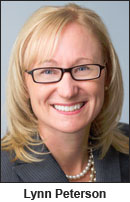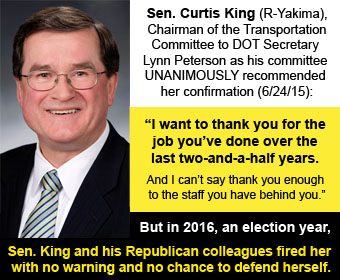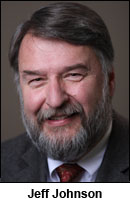OPINION
Senate Republicans: Put down the shovels, get out of the hole
By JEFF JOHNSON
As Molly Ivins used to say, “The first rule of holes: When you’re in one, stop digging.”
 My message to Senate Ways and Means Chairman Andy Hill (R-Redmond) and the Senate Republican majority: “Put down your shovels.”
My message to Senate Ways and Means Chairman Andy Hill (R-Redmond) and the Senate Republican majority: “Put down your shovels.”
Expectations were low for the 2016 legislative session and these expectations were met.
I’m not saying that nothing good came out of this session. And I’m surely not saying there’s no difference between the Democratic-led House and the Republican-led Senate.
I am saying that the partisan gridlock we have suffered through since the Senate came under Republican control has prevented us from dealing with the biggest issues facing our society today: fully funding education, providing critical social services, creating fair voting rights, addressing income inequality and the opportunity gap, rebuilding our infrastructure, creating a fair and adequate revenue structure, and dealing with climate change, to name just a few. Partisan political gridlock has weakened our communities and our democracy.
 The gross political attack on Gov. Jay Inslee through the Senate Republican’s firing of Secretary of Transportation Lynn Peterson laid bare the stark partisan lens through which they view the world. Secretary Peterson had been universally praised for her work on the Skagit River replacement bridge and Oso reconstruction work. She was complimented by the Republican chair of the Senate Transportation Committee, Sen. Curtis King (R-Yakima), for her work on the 2015 transportation package.
The gross political attack on Gov. Jay Inslee through the Senate Republican’s firing of Secretary of Transportation Lynn Peterson laid bare the stark partisan lens through which they view the world. Secretary Peterson had been universally praised for her work on the Skagit River replacement bridge and Oso reconstruction work. She was complimented by the Republican chair of the Senate Transportation Committee, Sen. Curtis King (R-Yakima), for her work on the 2015 transportation package.
 Yet she was insulted and disrespected, as were the hardworking employees at the Washington State Department of Transportation, on the Senate floor as Republicans fired her with no notice and no opportunity to defend herself. Apparently the desire to score some cheap political points overrode Secretary Peterson’s record as well as standards of common decency.
Yet she was insulted and disrespected, as were the hardworking employees at the Washington State Department of Transportation, on the Senate floor as Republicans fired her with no notice and no opportunity to defend herself. Apparently the desire to score some cheap political points overrode Secretary Peterson’s record as well as standards of common decency.
This level of partisanship does not bode well for putting the shovels down. Yet the budgetary day of reckoning is nearly upon us.
Going into the 2017-19 biennial budget cycle, our Legislature will have to ante up $3.5 billion to satisfy the Supreme Court order to adequately fund K-12 education, plus $1 billion for mental health services, plus another $1 billion or so for caseload growth. Talk about holes. “Can you hear me up there?!”
We are in a seriously deep revenue hole that no budgetary tricks or fund sweeps are going to resolve. The Legislature has been digging this hole for a long time, but now it’s time pay up (see Joe Kendo’s revenue article on Page 1). When those negotiations begin, remember that a big part of being an elected official is to “tax and spend” for the good of our state and its residents. The taxing part ought to be done in a way that creates fairness and the spending part is an investment in those common things that benefit us all.
How partisan these negotiations are will be determined in large part by the 2016 elections. Given the current state of the economy and the issues being raised in the presidential race, voters are paying attention to what their legislators do — and what they neglect to do. A quick inventory of issues voters are expressing their interest in include:
● Raising the minimum wage and providing paid sick days;
● Expanding voting rights;
● Opposing trade deals that cause job and income loss;
● Restoring democracy by overturning Citizens United;
● Protecting employment standards including prevailing wages and apprenticeship training;
● Enhancing safety and health at the workplace;
● Supporting collective bargaining rights;
● Taxing the polluters and reinvesting carbon revenue in a “just transition” for workers, communities, vulnerable populations, and creating jobs in the clean energy economy;
● Making sure that those with high incomes and wealth pay their fair share of taxes;
● Investing fully in K-12 public education before considering charter schools;
● Investing in our crumbling infrastructure;
● Building affordable housing; and
● Ending mass incarceration and giving ex-offenders a second chance by “banning the box” and reforming exorbitant legal financial obligations that block the path to re-entry.
Many of these issues are captured in the WSLC Legislative Voting Record for 2015 and 2016, or in this Legislative Report as worthy bills introduced but not passed. These are the types of issues union members and non-members alike are interested in hearing politicians discuss on the campaign trail. Many bills addressing these issues have passed the House over the past two years, but not the Senate.
It’s time to put the shovels down. It’s time to get out of the hole.
 Jeff Johnson is President of the Washington State Labor Council, AFL-CIO, the largest labor organization in the Evergreen State, representing the interests of more than 600 local unions and approximately 450,000 rank-and-file union members. This column appears in the WSLC’s 2016 Legislative Report.
Jeff Johnson is President of the Washington State Labor Council, AFL-CIO, the largest labor organization in the Evergreen State, representing the interests of more than 600 local unions and approximately 450,000 rank-and-file union members. This column appears in the WSLC’s 2016 Legislative Report.





